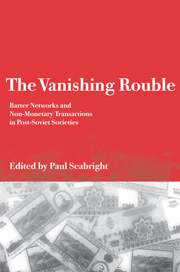Introduction: barter networks and ‘information islands’
Published online by Cambridge University Press: 05 May 2010
Summary
Money and barter
Due to a lack of pockets, wildebeest cannot carry cash or credit cards. Among animals, only marsupials have pockets, and then just to keep their young inside. And there are various difficulties, practical and theoretical, with an economic system based on inch-long blind and hairless kangaroos.
(P. J. O'Rourke, Eat the Rich)A reader of some of the remarkable stories of invention catalogued in this volume could be forgiven for thinking that baby kangaroos are among the very few items that have not at some point been employed as media of exchange in transition economies in recent years. Particularly in the countries of the former Soviet Union, an increasing proportion of economic transactions during the 1990s, especially those between large firms, have taken a complex non-monetary form. They have sometimes involved exchanges of goods for goods, more often circular chains of transfers of both physical and financial assets, sometimes the issue of bills of exchange (called veksels in Russian) that, whether denominated in money or not, frequently end up being redeemed in goods. What is notable about these transactions is not primarily their complexity – financial transactions in market economies (especially those involving derivatives) can be notoriously baroque – but rather two facts. First, they take place as part of the normal process of production and disposal of goods and services in the real economy.
- Type
- Chapter
- Information
- The Vanishing RoubleBarter Networks and Non-Monetary Transactions in Post-Soviet Societies, pp. 1 - 12Publisher: Cambridge University PressPrint publication year: 2000
- 1
- Cited by



